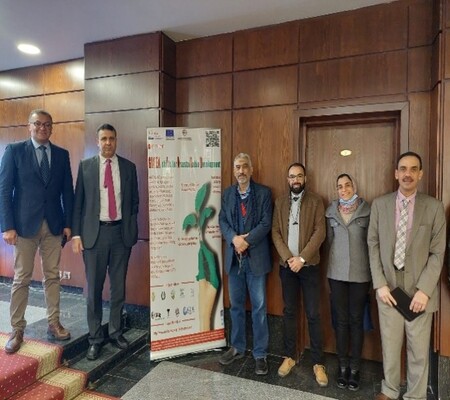
In the Southern Mediterranean countries, there is a growing demand for resource efficiency (RE) services to address environmental challenges. However, the supply of RE services remains low due to a lack of an effective innovation process. The MAIA-TAQA initiative aims to tackle this issue by establishing demonstrators in three Mediterranean pilot areas. These demonstrators will apply innovative services related to micro-grids, photovoltaics, energy storage, solar thermal technologies, and water sanitation. The initiative will address specific barriers through a capacity building program, an innovation desk, guidelines, vouchers, and targeted B2B events. The primary beneficiaries are SMEs in the environment/utility/building sector, who will receive support to overcome barriers and minimize innovation risks. The consortium countries: Greece, Egypt, Italy, Jordan, Lebanon, Spain.
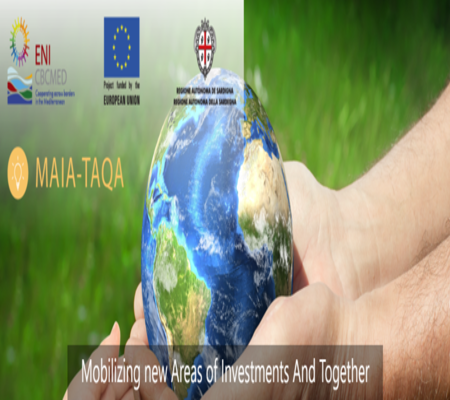
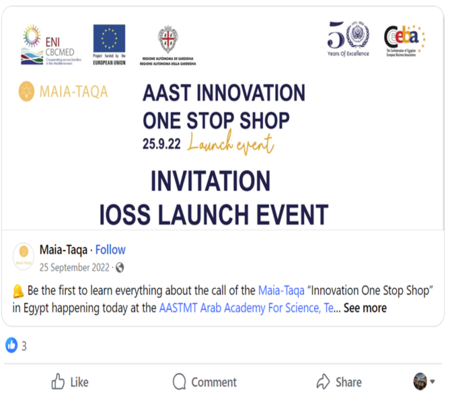
The MED-QUAD project aims to address the innovation and growth challenges faced by micro enterprises in Mediterranean regions by fostering cooperation among universities in six countries. Focused on the Quadruple Innovation Helix, the project involves universities acting as "civic universities" in collaboration with cities, socio-economic stakeholders, and citizens. Two cross-border Living Labs will be established to implement pilot activities for technological transfer and research commercialization, utilizing ICT and Key Enabling Technologies. The project will focus on Smart Water Use Applications (SWUAP) for water optimization and Applied Research for Cultural Heritage Exploitation (ARCHEO) for cultural heritage promotion. MED-QUAD aims to enhance institutional capacities through a toolkit, facilitating collaboration between businesses, cities, and universities on both sides of the Mediterranean for inclusive development. Consortium countries are Greece, Italy, Egypt, Jordan, Palestine, Tunisia.
Mediterranean Quadruple Helix Approach to Digitalization Funded Project (2020- present)

The ADAPTM Project, supported by the Erasmus+ Program’s Key Action 2, aims to enhance higher education in applied Physical sciences (Environmental science) in Egypt. Aligned with the Bologna Declaration and European standards, the project focuses on modernizing and internationalizing partner Egyptian institutions, creating interdisciplinary Master degree programs like "Smart Environment and Climate Change Management." The objectives include designing a curriculum integrated with European systems, engaging researchers and practitioners, training academic staff, implementing innovative learning methods, and demonstrating the benefits of Bologna process principles. Additionally, the Maritime Postgraduate Studies Institute offers the "SECCM" Master of Science program, addressing climate change effects and adaptation. This international joint program involves European and Egyptian universities, providing specialized internships and multinational professors. The program follows the ECTS system and is conducted in English over two years, with a focus on practical application and a research thesis in the fourth semester.
Climate Change Management Through Mitigation And Adaptation (ADAPTM) (2017-2021)
Climate Change Management Through Mitigation And Adaptation (ADAPTM) (2017-2021)

Trace & Trust Hubs for Med Food (2020-2023)
The MED Food TTHubs is a PRIMA project with the goal of enhancing the safety and sustainability of Mediterranean food products by implementing full-path tracing practices from seed to shelf. The project employs cutting-edge technologies and Internet of Things (IoT) solutions to ensure transparency, traceability, and authenticity throughout the food supply chain. It focuses on standardized approaches to production processes, location identification, transparent monitoring procedures, and innovative business partnerships. The initiative establishes seven pilot Trace & Trust Hubs forming a transnational network, serving as a one-stop-shop for traceability and authenticity of high-value Mediterranean food products. The consortium involves 10 partners from Greece, Portugal, Spain, Italy, Egypt, Tunisia, and Jordan, each contributing diverse expertise to the project.
Trace & Trust Hubs for Med Food (2020-2023)
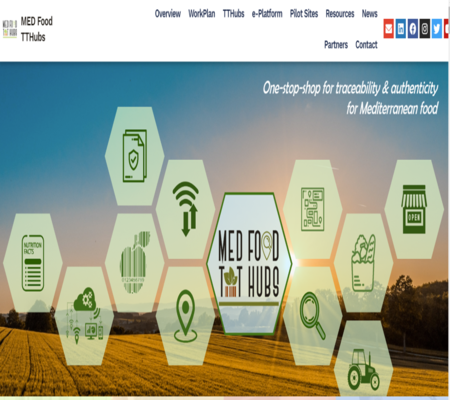
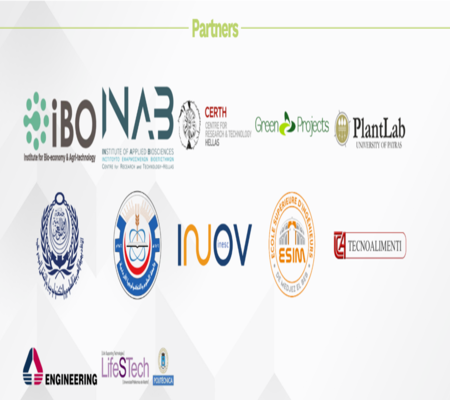
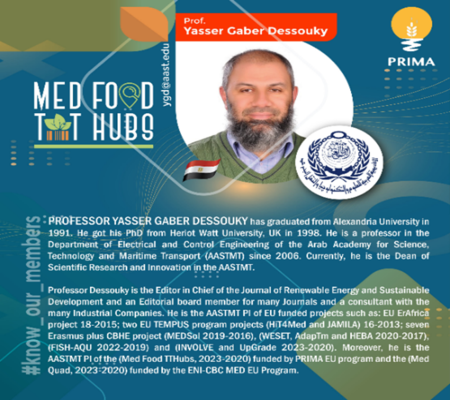
RESILINK is a project focused on building resilience in smallholder communities through real-time information exchange and shared resource networks. Utilizing advanced digital technologies, including Internet-of-Things (IoT), Edge Computing, Linked-Data, and AI-based Decision Support System (DSS), the project aims to provide sophisticated yet user-friendly solutions for smallholders. Central to RESILINK is the development of simple and intuitive mobile applications that interact with digital platforms, enabling smallholders to link and share information in real-time. The project adopts a unique platform-of-platforms approach, integrating existing and future platforms into comprehensive dashboards/portfolios. Key objectives include seamlessly integrating IoT technologies, developing AI-based decision-making processes, ensuring a resilient network, implementing the platform-of-platforms model for large-scale adoption, and conducting extensive piloting and evaluation programs with smallholders for comprehensive testing and adoption.
RESILINK project
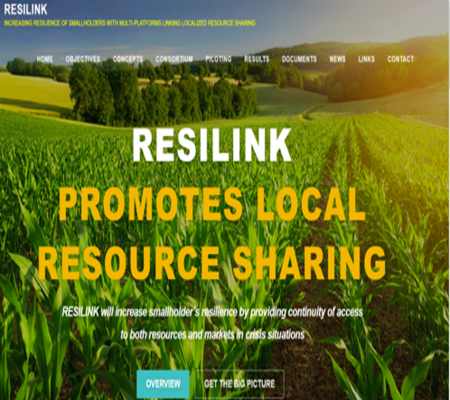
The HEBA project, initiated on October 15, 2017, and funded by the European Union through Erasmus+, spans three years with the goal of reforming and enhancing existing master programs in Energy Efficiency (EE) and Renewable Energy (RE) in Jordan, Lebanon, and Egypt. The project aims to establish or improve Centers/Laboratories of EE+RE and contribute to societal and environmental protection. The consortium aims to produce qualified professionals capable of managing the development of EE+RE infrastructure, with a particular focus on advanced energy management. The project emphasizes interaction with professional communities to tailor curricula to their needs and challenges, incorporating valuable insights from the European Union experience. The adapted curricula will address the specific requirements of the building, industry, and energy sectors.
HEBA course project on ERASMUS webpage [21]
High Level Renewable and Energy Efficiency Master Courses (2017-2021)

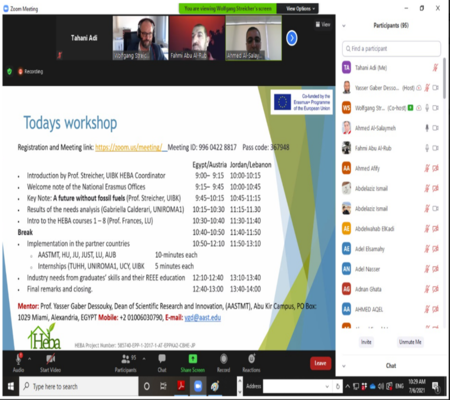
Knowledge exchange in sustainable Fisheries management and Aquaculture in the Mediterranean region (2019-2023)
FishAqu (Knowledge Exchange in sustainable Fisheries management and Aquaculture in the Mediterranean region) is a project, co-financed by the European Commission through the Erasmus+ programme, in the area of Capacity Building in the field of Higher Education. The aim of the project is to develop capacities of practitioners and academics working on fisheries management and aquaculture in Egypt, in line with the directives of the Bologna process and the strategies of European Policy Cooperation (Education and Training 2020 framework) in order to launch a master degree programme on fisheries and aquaculture in Egypt. The project started on 15 November 2019 and will last until 15 November 2022.
The consortium is composed of eight project partners; four EU and four Egyptian universities.

The AASTMT is actively involved in the "GREEN-skiLls for a sustAiNable Development" project. This initiative aims to combat poverty and promote social inclusion by equipping unskilled and underprivileged youth with marketable skills in the Green and Circular Economy, potentially generating numerous job opportunities. To achieve this, the project focuses on developing new curricula aligned with market needs, transferring skills to NEETs (Not in Education, Employment, or Training) and women, creating media-based training tools, and fostering cultural exchanges among youth in the Mediterranean region, where high rates of youth and female unemployment persist. AASTMT collaborates with partners from Lebanon, Jordan, Egypt, Palestine, Italy, Portugal, and Greece. The academy manages work package 4 (WP4), which involves establishing an e-platform with specialized curricula, transferring skills to NEETs, and providing advanced training tools. The GREENLAND project seeks to create employment opportunities through sector-skills alliances between Technical and Vocational Education and Training institutions (TVETs) and Small and Medium Enterprises (SMEs).
Video for Greenland project on social media
"GREEN-skiLls for a sustAiNable Development" Project (2020-2023)
"GREEN-skiLls for a sustAiNable Development" Project (2020-2023)
